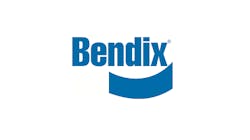Tech Tip: Tire safety considerations for National Tire Safety Week
Proper tire pressure matters—a lot. It can’t be put more simply than that, but during National Tire Safety Week 2021, Bendix Commercial Vehicle Systems LLC (Bendix) reminds fleets and owner-operators across North America just how big an impact the air in your tires has on how much fuel you burn, how much downtime you risk, and how effective your truck’s safety equipment is.
National Tire Safety Week is an initiative aimed at providing information on the essentials of proper tire care and maintenance, sponsored annually by the U.S. Tire Manufacturers Association (USTMA). This year it occurs June 28-July 4.
“Safety, stopping distance, fuel efficiency, operating costs, and tire life are all directly affected by running on properly pressurized tires,” said TJ Thomas – marketing and customer solutions director, Controls at Bendix. “Additionally, as a growing number of fleets and drivers discover the advantages of air disc brakes and advanced, integrated collision mitigation technologies, it becomes that much more important to remember that properly inflated tires are crucial to realizing the full performance benefits and protecting their investments.”
A tire that’s just a few psi below its proper pressure may seem like no big deal, but according to the American Trucking Associations’ Technology & Maintenance Council, running on a tire that’s underinflated by as little as 10% can reduce fuel economy by 1.5%. At 20% underinflation, in addition to those lost miles per gallon, the effects include a roughly 30% reduction in tire life. And about 90% of tire blowouts are the result of underinflation, according to industry studies, owing to the increased stress and higher running temperatures experienced by an underinflated tire.
“There’s another complication from improper inflation specific to dual-tire wheel-ends—uneven pressures,” said Guangning Zhao – product group director, Anti-Lock Braking Systems at Bendix. “Even if there’s a difference of just 5 psi between two tires on the same wheel-end, one tire winds up carrying a greater share of the load and doing more work. As the tire assembly rotates, the tire with the lower pressure—being slightly smaller—will drag, causing premature wear and shortened tire life while increasing the odds of a blowout on the higher-pressure tire.”
Even keeping a close eye on a truck’s tires during breaks or spot checks may not always be enough to recognize developing problems. Slow, gradual leakage, for example, can catch up with you over the miles, and even the sharpest-eyed driver may not be able to tell at a glance the difference between a properly inflated tire at 105 psi and one that’s pressurized only to 95 psi.
“By keeping tabs on tire inflation and temperature, a tire pressure monitoring system helps keep the wheel-ends ready to deliver optimal performance when brakes and safety technologies like full-stability—and the more advanced systems built upon it—are activated,” Zhao said. “If you want to get the most benefits out of today’s vehicles, it makes sense to equip them with the best set of safety tools. Protecting your tires from underinflation is one more way to protect your drivers, vehicles, and everyone on the road around them.”
The SmarTire Tire Pressure Monitoring System (TPMS) by Bendix CVS and the SmarTire Trailer-Link TPMS by Bendix CVS for trailers use wheel-mounted sensors inside the tires as opposed to exterior-mounted sensors on the valve stem. This enables SmarTire to continuously monitor both temperature and pressure, meaning the system can provide a deviation value showing the amount of overinflation or underinflation from the tire’s cold inflation pressure (CIP), automatically taking into account any increase in pressure due to temperature, and providing early alerts of tire pressure issues. Tracking a tire’s internal temperature may also help mitigate potential tire fires, since it helps alert the driver to potential wheel-end issues such as dragging brakes.
Fleets can also use TPMS system data to more effectively address issues such as tire failures on the road and frequent tire replacements, thus helping to shape a better tire strategy and maintenance plans. For example, the SafetyDirect by Bendix CVS web portal enables analysis of real-time information from TPMS and other connected safety technologies to help improve uptime and lower total cost of operation (TCO).
“As with any vehicle safety technology, a TPMS complements safe driving practices and is not intended to enable or encourage aggressive driving,” Thomas noted. “No technology on the road today is a replacement for a skilled, alert driver exercising safe habits and supported by proactive, comprehensive driver training, and safe operation of any vehicle remains with the driver at all times.”
Bendix SmarTire TPMS and the SafetyDirect system are part of Bendix’s ever-growing portfolio of technologies that deliver safety, vehicle performance, and efficiency, all backed by unparalleled post-sales support. By enhancing areas critical to the success of fleets and owner-operators, and strengthening return on investment in advanced equipment that puts drivers behind the wheels of safer trucks, Bendix lowers total cost of ownership and helps enhance highway safety across North America.
Information provided by Bendix Commercial Vehicle Systems.
